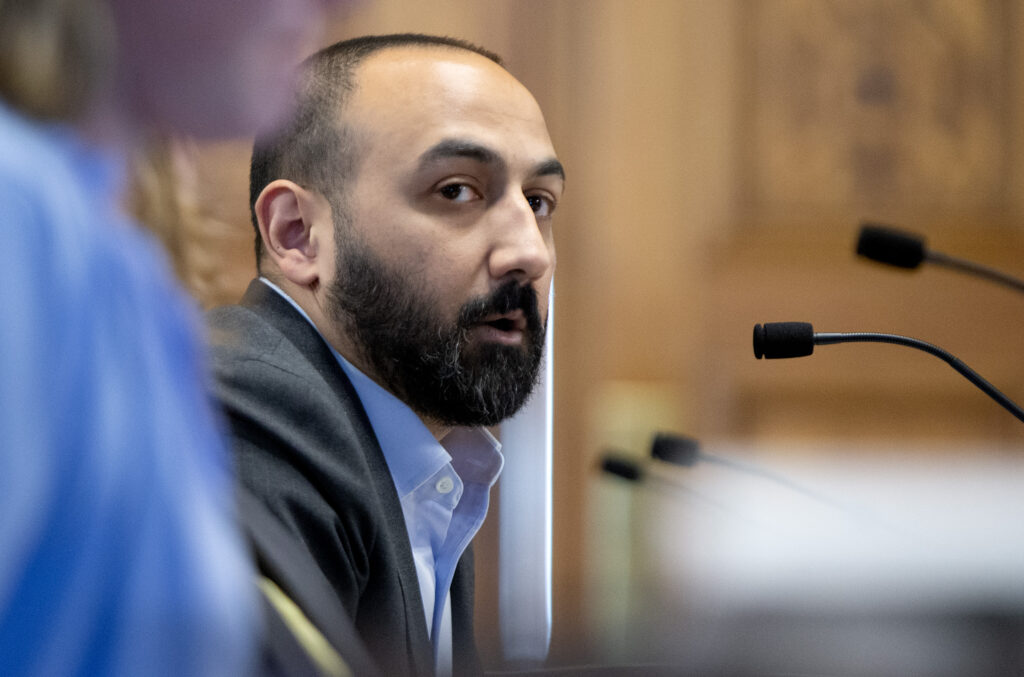Pittsburgh City Council mulled for hours Tuesday over a proposal that would establish a uniform process for transferring properties to the city land bank, as officials try to get some of thousands of city-owned properties back on the tax rolls.
Top appointees in the Gainey administration joined Council for a special afternoon session to talk through the stalled proposal, which still needs a public hearing and would build upon an ordinance that already authorizes Council to send over land. Much of the discussion focused on political questions about how involved Council should be in the operation of the land bank, which aims to get unproductive properties back to beneficial use. At issue is whether specific land uses or even buyers should need to get Council approval.
Under the proposal, the land bank first would send a list of properties it would like to acquire to the city planning and finance departments for approval. The land bank’s board and Council then would both have to sign off on moving the properties, which would enter the land bank sale process.
Negotiations have deadlocked for more than a year on the proposal, delaying other key milestones for the land bank, such as transferring $7 million in federal COVID-19 funds already earmarked. The land bank also has yet to sign an agreement with the county, city and city school district on how to remove tax liabilities from properties — the most crucial step in getting a property back to productive use.
Several councilors, including Barbara Warwick, said they were concerned about a potential lack of Council input on the ultimate buyer for land bank properties. Three councilors sit on the land bank’s board, and there are ample opportunities for the public to weigh in about a potential sale.
“As the councilperson, you kind of want to maintain that leverage for your community, in case the land bank does something the community doesn’t want,” Warwick said.
Likewise, Council President Theresa Kail-Smith said she is “always tense” when it comes to deciding how city-owned land should be used, and she needed to think more about the proposal.
“I don’t know that what you want to do is bad,” she said. “I’m just saying I think I want to make sure my public and my community has a voice in this.”
Other members pushed back, including Erika Strassburger, who compared land bank sales to approvals granted by the city zoning board. She believes the city “should be moving fast on this” and not unnecessarily slow the process.
“We have authorized this entity, and they have a role, and it’s something we are not taking on, nor do we have time to take on,” Strassburger said. “I don’t know why the same couldn’t be true — we will be notified when the transfer request comes through Council. We’ll have two weeks to deliberate.”
One option discussed was to include deed restrictions on properties sent to the land bank, forcing them to be used in a certain way.
City solicitor Krysia Kubiak said some properties could potentially be limited to affordable housing, or require that the owner live there. She added that the city recently assigned another attorney to handle real estate matters.
“Buyers who would buy them for cheap, and then be able to get a loan to invest in the renovation,” Kubiak described of a potential strategy. “We are exploring that right now and hope to have a plan on that as well, coupled with some of the [Urban Redevelopment Authority] funding streams that are out there.”
Kyle Chintalapalli, the city’s chief economic development officer who also serves as the URA board chair, said officials would take Council concerns into account and give the proposal another look.
“It’s always that balance,” he said, “between what do we put in with policy to be able to still have something that’s nimble, right? And durable.”

Council also discussed other ways land can get off the city’s books, including through the side-yard program and a treasurer’s sale, which rewards the highest bidder.
Jennifer Gula, the city’s treasurer and finance director, said her office has worked to reorganize itself and speed up sales. The city sold 68 properties through the treasurer’s sale process last year, with 95 still in progress. It has largely kept pace with that performance halfway through this year, with 94 in progress and 29 closed.
Gula said she’s trying to schedule more treasurer’s sales, which are essentially public auctions, but cautioned against trying to advance properties for which there is no known seller since they will otherwise end up on the city’s books.
“We’ve had issues where we have collected so many properties through the treasurer’s sale process that it’s been a difficult process maintaining them, it’s been very costly,” she said. “Sometimes the sales process can be very slow, so they don’t necessarily move through our pipeline very quickly.”
Councilor Deb Gross, who organized the meeting, urged careful consideration of the different ways that the city can restore its land to productive use.
“We want to figure out which of the kinds of properties that we have are appropriate for which of these tools,” she said.
Jon, a copy editor and reporter at the Pittsburgh Post-Gazette, is currently on strike and working as a co-editor of the Pittsburgh Union Progress. Reach him at jmoss@unionprogress.com.


